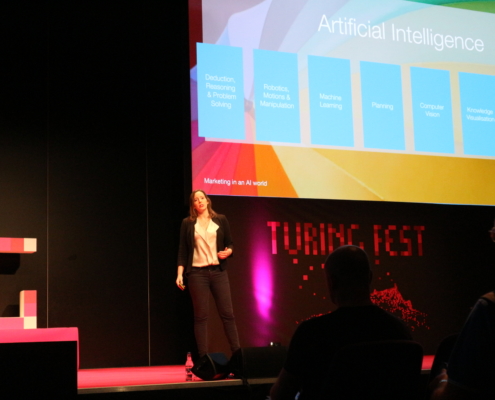AI & Voice Searches: The Future of Digital Marketing?
Last week, the digital marketing world descended on Mackerel Media’s hometown of Edinburgh for Turing Fest 2018, and we were there to bring you the latest developments in digital marketing!
Across six digital marketing experts – one clear theme emerged time and time again: Google’s growing fondness of AI lead search results, specifically the use of voice recognition technology and the effect it will have on how we as digital marketers are able to advertise clients in the changing Search Engine results space.
While the scale of voice searches is a bone of contention between digital marketers – even here in the Mackerel office there are differing opinions on how commercially useful they actually are right now– one thing is undeniable: with the growth of ‘smart’ voice assistants such as Apple’s Siri and Amazon’s Alexa, 50% of all searches made by 2020 are expected to be initiated by voice and powered by machine learning.
Just Sayin’
Why is there such a push towards voice activated searches? Well, according to Cindy Krum, one of Turing Festivals Marketing Track speakers, it’s simple: Google wants to rank more than just websites and present result in a way personalized to your interests.
This makes a lot of sense, and Google has already begun using AI systems to start organizing which videos you see on YouTube, which Apps get returned to you when you do a search and can even allow you to do smart searches through your photographs stored in the cloud.
To allow this to happen, Google has had to change the way it thinks about the information it stores, and how it organizes that information. Whereas previously, Google grouped information together based on the words and phrases a website contained, in a world where not every bit of information a user is searching for has a website, Google has had to change tact – and it’s doing it via AI that you and I are helping to program.
Jes Scholtz – another Turing Fest 2018 speaker – points out that we’re constantly helping to tweak machine learning systems into better understanding what it is we’re looking for, and we may not even realise it. Those thumbs up and thumbs down icons in Netflix? Each time you give a rating you’re helping Nextflix refine its algorithm designed to show you the content most relevant. Same goes with Gmail’s “Mark as Spam” button. None of this is new, but the way in which the data is interpreted is – the massive scale of data gathered plus the application of AI to incorporate many other signals such as the time of day you hit thumbs up, or where you are when you hit ‘Mark as Spam’ leads to a massive improvement in the quality of the algorithms.

Jes Scholz discussed the importance of Marketing in an AI World.
The End of the Website as We Know It?
So how does this relate to Voice Search? Well, traditional search engine results pages just aren’t suitable for devices that use voice technology to provide results to a query. Nobody wants to ask Alexa for places to buy a certain item only to be confronted with a list of 20 webpage URL’s read out one… letter… at… a… time…
What voice activated search results need to do is determine the most relevant piece of information for that search and return it right there and then, and they’re doing it through machine learning and combining that with their vast understanding of a users personal history, interests, behaviors & search intent.
We’re already seeing this type of ‘definitive information’ result being surfaced in the form of knowledge panels, direct answers in the SERPs and informational sidebar results. According to Cindy Krum, this type of search result has grown more prominent with mobile and voice results containing a knowledge graph answer climbing from 35% in 2016 to 60% in 2018.
Clearly, Google is putting a lot of emphasis on this type of result. Google’s end game, according to Cindy Krum, is allowing Google to become “the presentation layer of the internet”– soon, we might not need to see a product website to be able to buy, we’ll just do it directly through the Google results.
Good news for voice assisted searches, bad news for websites.
Hey Siri, What Do I Do Next?
The biggest question you might now have is how do we prepare for a world in which Google might not even consider our website before providing just one answer to a voice search?
One of the most interesting speakers at Turing Fest 2018 was Yoast’s very own ‘Mad Scientist’ Jono Alderson – who joined us on stage to explain how brands need to learn some important lessons from the pre-digital marketing era in order to succeed in the future.

Yoast’s very own Jono Alderson describes the power of ‘brand currency’.
Big brands have always relied on ‘story telling’ and relationship building with customers to position themselves at the forefront of their mind when decision making, and that is how brands of the future are going to stand out from the voice-search crowd.
Brands need to start thinking about how future customers may want to interact with their brand months or even years before the searcher even knows they want to buy a product. If Google knows a user has a documented history of interacting with a brands content, social media, pictures or other media, the more likely they are to consider that brand for a user’s personalised search result. The more a user knows and cares for a brand they’re presented with by Siri as a single voice-search result, the more likely they are to explore that search result further.
Jono Alderson calls this ‘brand currency’, and it’s invaluable in a world where AI powered voice search is dominant. If a searcher has no affinity with a brand, they’ll just search again and you may have missed the only opportunity you’ll have for that user to interact with your brand. What’s worse, is that Google could use its machine learning and AI to update its algorithm and push you out of that individual users ‘pool’ of potential search results in the future, having marked you as not of interest to the user.
How Do I Even Appear for Voice Searches?
It’s clear that Google see’s the future of search as hyper-personalised, AI driven results where even a single interaction with a brand can influence how a user is presented information, but we still need to make sure that we’re even eligible to be considered by a voice-search engine in the first place.
Thankfully, Google has already given us a suite of tools and platforms designed to specifically do that: Google My Business, Knowledge Graph results, Google Maps and a whole host of technical tools such as Schema Mark-Up and the Google Natural language API tool.
In a world where ‘on-the-go’ searches are becoming increasingly familiar – and where Google is able to collect vast quantities of data on the brands you interact with and what your feelings towards them are – what becomes the defining factor of whether a search result is presented or not is relevancy. Google now considers these ‘supporting’ pieces of information to be just as important – if not more so – than the content of a website or the products a brand sells.
If I do a voice search for “French restaurants near me”, guess what? The one which has its opening times and address listed on GMB is the one that a voice-assistant is going to return as my answer, because that’s the one I’m going to be more likely to go to. The same goes for e-commerce businesses which provide clear product prices or service providers who produce great knowledgeable content about their specific offerings. Again, Google is cutting out the middleman and giving us just the answers it thinks we want to see.
Do We Really Think This is the Future of Search Marketing?
To put it bluntly, if this is what Google is saying the digital marketing landscape is going to look like in the future, then it’s worth making sure we are prepared for a world where voice-searches overtake traditional text-based queries.
For the most part though, brands which take their digital marketing activities seriously needn’t worry too much. All of the tools Google has indicated may tip the balance of one search result appearing over another – such as Google My Business or Mark-up Schema – have already become part of most really good digital marketing strategies, and are easy to set up should you have forgotten.




